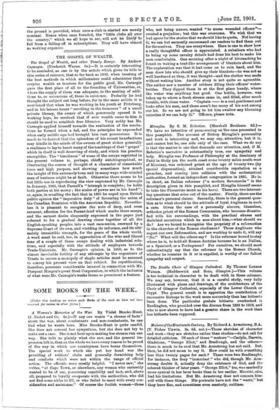THE GOSPEL OF WEALTH.
The Gospel of Wealth, and other Timely Essays. By Andrew Carnegie. (Frederick Warne. 6s.)—It is certainly interesting to be reminded, as one is by the article which gives its title to this series of reissues, that so far back as 1899, when treating of the best methods in which millionaires could administer their surplus wealth as trustees for the public good, Mr. Carnegie gave the first place of all to the founding of Universities, or, where the supply of them was adequate, to the making of addi- tions to, or extensions of, those in existence. Probably he had thought the subject out long before, for in the same article it is mentioned that when he was working in his youth at Pittsburg, and in his leisure hours "revelling in the treasures" of a small private library, the owner of which generously opened it to working boys, he resolved that if ever wealth came to him it should be used to establish free libraries. Very nobly has Mr. Carnegie applied himself towards the realisation of the resolu- tions he formed when a lad, and the principles ho expounded when early middle age had brought him vast possessions. It is much to be desired that the splendour of his recent benefactions may kindle in the minds of the owners of great riches generally a readiness to lay to heart many of the teachings of that " gospel '' which in itself is well deserving of study, and which his practice exemplifies. The " timeliness " of some of the essays reprinted in the present volume is, perhaps, chiefly autobiographical, as illustrating the course of thought of a character of remarkable force and high purpose, and showing sometimes how much the insight of this extremely keen and in many ways wide-minded man of business might be at fault. Otherwise there seems to be but little use in reproducing the view expressed by Mr. Carnegie in January, 1886, that Parnell's "triumph is complete ; he holds both parties at his mercy ; the scales of power are in his hand " ; or, again, in recalling the fact that in 1891 he urged upon British public opinion the "imperative duty" of favouring the union of the Canadian Dominion with the American Republic. Neverthe- less it is pleasant to recognise the note of deep, and even reverent, affection for the Parent-land which marks these essays, and the earnest desire eloquently expressed in the paper just referred to for a gradual drawing closer together of all the English-speaking peoples into a vast race-union, crowned by a Supreme Court of its own, and wielding its influence, and its ulti- mately irresistible strength, for the peace of the whole world. A word must be said, too, in appreciation of the wise and liberal tone of a couple of these essays dealing with industrial rela- tions, and especially with the attitude of employers towards Trade-Unionists. Mr. Carnegie's opinion, in 1900, as to the almost inevitable futility of any attempts by the organisers of Trusts to secure a monopoly of staple articles must be assumed to convey his present view on that subject. Its republication, therefore, possesses considerable interest in connection with Mr. Pierpont Morg,an's great Steel Corporation, in which the inclusion of what were Mr. Carnegie's works forms so prominent a feature.










































 Previous page
Previous page